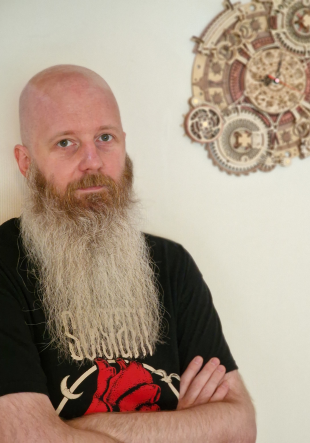Dr. Adrian Keller receives Paderborn University Research Award
Antibiotics are regularly used in medicine to fight bacterial infections. However, resistant germs to which drugs are unable to respond are now increasingly emerging, especially in hospitals. This is because as bacteria reproduce and further develop, their genetic material – i.e. their DNA – can change to make them resistant to antibiotics. A research project at Paderborn University led by scientist Dr. Adrian Keller is tackling this issue. Its aim is to combat resistant germs using DNA-based nanoantibiotics, and the scientist has now received Paderborn University’s 2022 Research Award for his efforts. This comes with prize money of 150,000 euros, to be used in any way he wishes to achieve the research goal. The university’s most generous prize recognises research projects that step off the beaten path to tackle unconventional hypotheses and methods as well as creative, innovative ideas. Professor Johannes Blömer, Vice President for Research and Junior Academics, presented the certificate to Keller on behalf of the Committee for Research and Junior Academics at the New Year’s reception on Sunday 15 January.
‘Current estimates suggest that around five million people die per year as a result of being infected with resistant germs, and this number is increasing as time goes on’, as Keller explained the relevance of the project. ‘Developing new antibiotics is a very laborious process. We therefore wanted to try and modify existing antibiotics to overcome or circumvent this resistance.’
Using ‘DNA origami’ to create effective antibiotics
In his ‘Nanobiomaterials’ working group within the ‘Technical and Macromolecular Chemistry’ research group, Keller is examining the chemical and structural properties of DNA materials. Scientists use ‘DNA origami’ to create DNA nanostructures, i.e. complex, microscopically small networks. ‘This enables DNA strands to be folded into any three-dimensional structures desired. Antibiotic molecules can then be arranged hugely precisely onto these. Using this method, we are seeking to design innovative drug delivery systems and thus restore effectiveness against antibiotic-resistant germs’, Keller continues.
To achieve this, the scientists are attaching the antibiotic molecules and other molecules to DNA strands, which are combined to create DNA nanostructures. The effectiveness of the different molecule combinations is then tested on various model organisms.
Universally applicable research findings are the end goal
‘Ultimately, we hope to develop a nanostructure that is effective against both antibiotic-resistant germs and germs that are susceptible to antibiotics. Furthermore, we want to understand how to arrange molecules to enable their maximum effect. In addition, we would like to identify specific effective molecule pairings, so that these findings can also be applied in other processes’, Keller explains regarding the project’s objectives.
The results of the two-year research project will be presented in 2024 at the Paderborn ‘Research Day’. A video has already been produced offering a glimpse behind the scenes in the working group’s laboratories. Detailed information can be found in the themed digital area 'DNA origami'.
About the Paderborn University Research Award
Since 2001, the Paderborn University Research Award has been recognising scientists seeking to implement extraordinary projects. The winner is selected by the Committee for Research and Junior Academics via an ideas competition. Keller is one of five scientists to win the award for the second time: in 2004 he was acclaimed for his project ‘Self-assembled DNA nanowires for the information technology of the future’.

![[Translate to English:] [Translate to English:]](/fileadmin/_processed_/1/d/csm_UPB_20230118_Forschungspreis_Roland-Mikosch_20c614d781.png)

